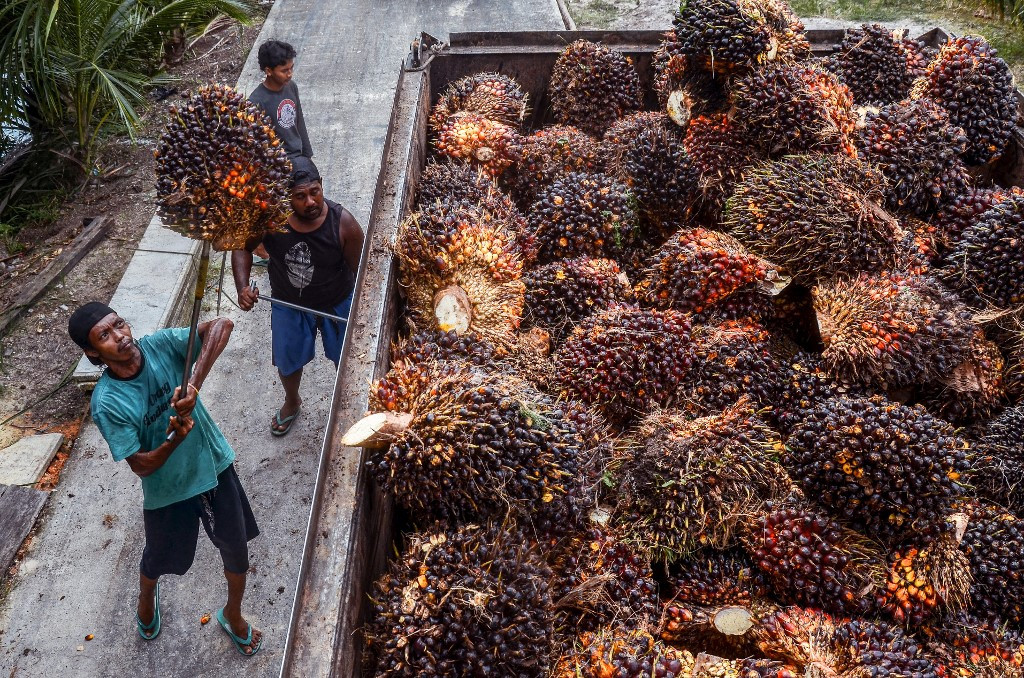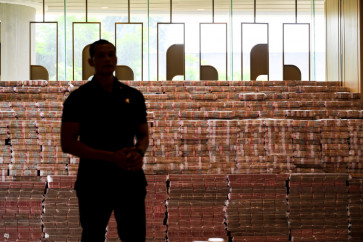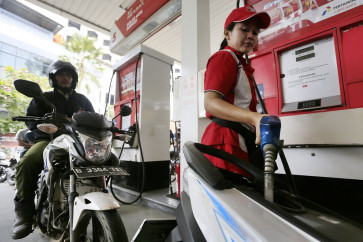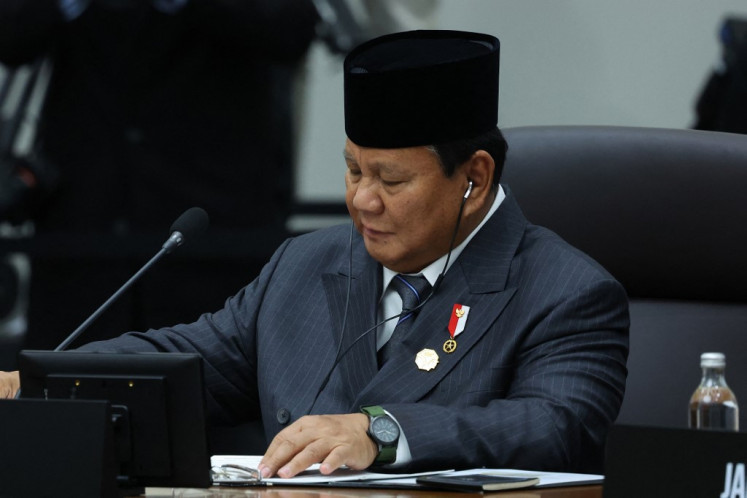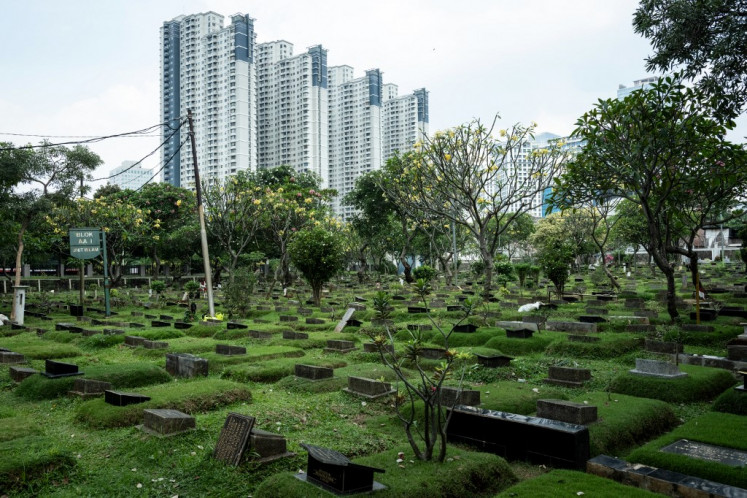Popular Reads
Top Results
Can't find what you're looking for?
View all search resultsPopular Reads
Top Results
Can't find what you're looking for?
View all search resultsElectronic invoicing is key to breaking the palm oil price mystery
Millions of farmers, who account for almost 40 percent of the country’s 16 million hectares of oil palm plantations, have been complaining about the steep decline in the price of their fresh fruit bunches as big companies that control the refining industry hesitated to increase stocks.
Change text size
Gift Premium Articles
to Anyone
N
ow that the week-long holiday for the Idul Fitri celebration has ended, businesspeople and even farmers' associations have begun asking when the blanket export ban on palm oil, which was imposed on April 28, would end.
President Joko “Jokowi” Widodo has said the export ban on crude palm oil, refined palm oil, refined, bleached and deodorized (RBD) palm olein and used cooking oil would be lifted only after the retail price of bulk cooking oil fell down to Rp 14,000 (96 US cents) per liter or half of the free market price at present.
But more than two weeks after the ban, the price of cooking oil remains far above the retail price ceiling.
Executives of palm oil companies and a number of analysts have doubted that the widescale export ban would be able to press down cooking oil prices to the target retail price. They said the international prices of palm oil would continue to skyrocket because the global shortage of edible oils could even worsen due to the likely protracted Ukraine crisis, as both Russia and Ukraine accounted for over 75 percent of the world’s sunflower oil supply.
Unless the government establishes a well-managed market intervention mechanism under a well-managed subsidy scheme, the export ban would only inflict more damage to the whole economy, cutting government revenues from palm oil export tax and surcharge and foreign exchange earnings. Last year alone, palm oil exports earned US$28.52 billion, or 14.20 percent of total non-oil exports.
Yet a more devastating impact of a longer export ban is the risk of massive worker layoffs in the palm oil industry, with the Indonesian market share of the global trade being eroded by Malaysia, the world’s second-largest palm oil producer.
In fact, millions of farmers, who account for almost 40 percent of the country’s 16 million hectares of oil palm plantations, have been complaining about the steep decline in the price of their fresh fruit bunches as big companies that control the refining industry hesitated to increase stocks.
The executives of several companies and palm oil industry associations have suggested that the government reimpose the 30 percent domestic market obligation (DMO), like the one in February and March. The previous DMO failed miserably because it was not managed and supervised by a single agency well-experienced in logistics and distribution. In this case, most palm oil company executives strongly recommend the State Logistics Agency (Bulog), which has distribution networks across the country.
Bulog could be directed to purchase 30 percent of the cooking oil sold by palm oil companies under the DMO scheme at the international price and then sell it to domestic distributors at a subsidized price to ensure that the final retail price would not exceed Rp 14,000 per liter
There is indeed an urgent need for the government to stabilize the domestic cooking oil price to protect the low-income population from the impact of skyrocketing global prices. In such extraordinary conditions, even such multilateral agencies as the World Bank have given their support for a price subsidy for staple foods under social assistance.
Bulog can finance its operations and stock management with funds from the Oil Palm Plantation Support Fund Management Agency (BPDPKS), which has been collecting hundreds of millions of dollars from the palm oil export surcharge (windfall tax).
The key to making the DMO effective is making the verification of domestic sales, as a prerequisite to obtaining an export license, a seamless process, and avoiding an arduous bureaucratic procedure that would disrupt export flows while shipment schedules have already been fixed in export contracts
This single point of domestic sale from producers to Bulog would avoid the need of verifying hundreds of domestic invoices with the Trade Ministry, which seemed to have been implicated in a controversy of alleged irregularities in the issuance of export licenses without proper verification of the DMO.
If producers are selling only to Bulog in light of implementing their DMO, then there is only one invoice to check.
But the key to the seamless and transparent verification of invoices requires the government to establish an international e-invoicing platform through which all export invoices could be created electronically.
Exporters wishing to issue an invoice to an overseas buyer would create an e-invoice online through an e-invoicing platform owned and administered by the Finance Ministry. As soon as the invoice is created, it could be shared in real-time with all other key agencies such as the trade, agriculture and industry ministries, as well as the central bank, the Taxation Directorate General, as well as the Customs and Excise Directorate General.
Such a platform would enable the Officer of the Coordinating Economic Affairs Minister to have real-time oversight of the volume of palm oil being exported, which could be matched against the domestic sales to Bulog and the production volumes known to the Industry Ministry. The verification procedure, which is the backbone of a successful DMO, would be solved when combined with cross-border or international e-invoicing.
Cross-border e-invoices are a powerful and comprehensive product. E-invoices cannot be repudiated or falsified. They have unique identifiers and can be delivered to all relevant parties in an instant. Suppliers cannot deny the issuance of an invoice and cannot alter an invoice once it has been cleared. Digitalizing the process in this way has achieved considerable success in Latin America.
Such a system could also be extended to imported goods and would ensure that goods and services procured from abroad are correctly invoiced, the right amount of tax is paid and external payments are fully reconciled with import declarations. They would become a reliable basis for the correct collection of value-added tax (VAT) and customs duties.
Another suggestion to help stabilize the price of cooking oil in the long run is for the government to scale down the biodiesel program, which last year alone consumed almost 7.5 million tons of the country’s total CPO output of almost 50 million tons.
The biodiesel program has so far spent almost 80 percent of the $3.6 billion collected by the BPDPKS from the palm oil export surcharge (windfall tax) between 2015 and 2021.
Now that both the international prices of palm oil and crude oil are at their peaks and will likely remain extremely high due to the uncertainty in the global energy market caused by the Ukraine crisis, the biodiesel program will need even larger subsidies.
Certainly, subsidizing cooking oil as a staple food is more essential than subsidizing biodiesel, however good the latter is for a gradual transition to renewable energy. The skyrocketing price of cooking oil contributed significantly to the 3.5 percent inflation year-on-year (yoy) in April.
***
The author is a sustainable palm oil analyst.

